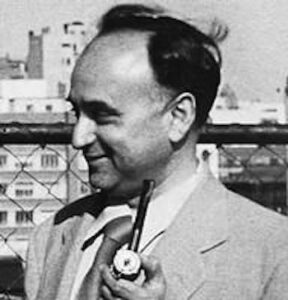
Yusuf Dadoo
Yusuf Dadoowas born on this date in 1909. He was a South African Coloured East Indian activist.
Yusuf Mohamed Dadoo was born in Krugersdorp, in the West Rand, near Johannesburg. His parents, Mohammed and Fatima Dadoo were Gujarati Muslim immigrants from Western India. As a young child, his mother scolded him for climbing a tree in his neighborhood park, which was reserved for white people only.
Aged ten, the Krugersdorp Municipality attempted to evict his father from his shop on racial grounds, but Mohandas Gandhi defended him in court. At high school, Yusuf attended meetings by former stalwarts of Gandhi and, along with Ismail Cachalia and other schoolmates, raised funds and awareness for the All-India National Congress. When he was fifteen, he and others protested the proposed Class Areas Bill. Later that year, he was sent to Aligarh College in India to complete his schooling. At age eighteen, having completed secondary education, Yusuf returned to Krugersdorp, where his father sent Yusuf to London to study medicine.
In London, Yusuf remained politically active at Edinburgh University while completing his higher education. In Edinburgh, Yusuf got a broader view of colonialism. He joined the Independent Labor Party. 1936 Dadoo returned to South Africa with his medical degree to revitalize the struggle against racial discrimination there. Shortly after his return home, he bought a house and set up a medical practice. He soon became involved with the Transvaal Indian Congress (TIC). In 1938, he became a founding member and secretary of the Non-European United Front (NEUF).
In 1939, Yusuf joined the Communist Party of South Africa (CPSA) and focused on anti-war activism during World War II's outbreak. By the war's end, the TIC and NIC were dominated by Dadoo and Monty Naicker, respectively. In 1947, the two signed the "three doctors pact" of cooperation between the African National Congress (ANC), TIC, and NIC, calling for the right to vote, freedom of movement, education, and equal opportunity for all non-European South Africans. 1950, the National Party (N.P.) won the all-White 1948 general election. The N.P. began implementing a formal policy of apartheid.
Dadoo was elected President of the SAIC, which promptly joined the ANC in organizing a defiance campaign against unjust laws. By 1952, the government responded to the Defiance Campaign by introducing more oppressive legislation. Dadoo was banned from attending all gatherings and ordered to resign from the SAIC and the Defiance Campaign planning committee. Under these bans, he could not openly participate in the Congress Alliance and the writing of the Freedom Charter. However, he continued to consult in secret. In 1957, he was banned from speaking to more than one person.
In 1960, the Sharpeville Massacre prompted the government to declare a state of national emergency. Dadoo evaded arrest and was smuggled out of the country to act as an international spokesperson for the Congress Alliance struggle in London. He was chair of the South African Indian Congress and Communist Party. He was a significant proponent of cooperation between those organizations and the African National Congress. He was a leader of the Defiance Campaign and a defendant at the Treason Trial in 1956. His last days were spent in exile in London. Yusef Dadoo died of prostate cancer on September 19, 1983. He is buried at Highgate Cemetery near the Tomb of Karl Marx.